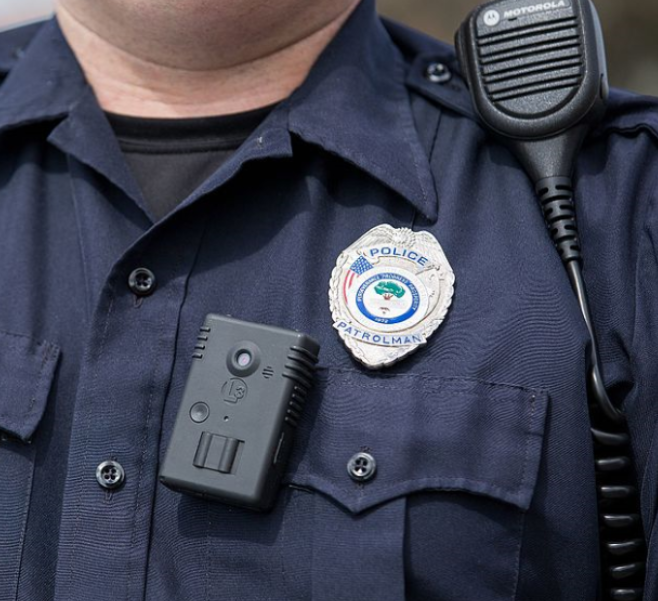Supervisors Considering Faster Body Camera Release For Sheriff’s Office
But supervisors do not have authority to set policy for Sheriff.

Police body camera. Photo by Ryan Johnson, (CC BY-SA 2.0), via Wikimedia Commons
Milwaukee County policymakers are considering a body camera policy that could require the Milwaukee County Sheriff’s Office (MCSO) to release video evidence to families in 48 hours and the public in 15 days.
This policy mirrors one approved by the City of Milwaukee’s Fire and Police Commission (FPC) in April. The city’s policy requires the Milwaukee Police Department to turn over body camera footage and other video to victims and families if police have killed or injured someone.
That city policy, though, never went into effect. The Milwaukee Police Association sued and Milwaukee County Circuit Court Judge Frederick Rosa granted an injunction blocking the implementation of the policy while the lawsuit plays out.
The county board’s Committee on Judiciary, Law Enforcement and General Services considered a resolution sponsored by supervisors Ryan Clancy, Juan Miguel Martinez and Caroline Gómez-Tom that asks the MCSO to develop a release policy “similar to the city of Milwaukee’s to foster greater public trust in County law enforcement and correctional facilities.”
This resolution would pertain to incidents where county law enforcement kills or injures someone, or a person dies in their custody.
Clancy called the policy “common sense” and said it was aimed at increasing transparency around these types of incidents.
Martinez said he understood video evidence is typically withheld because it is part of an ongoing investigation, but said families of victims should have early access.
“It should be allowed to be turned over to the family for them to have that final closure,” Martinez said. “This is a measure for the people to maintain some sort of a semblance of sanity.”
The resolution also requests a similar policy from the Milwaukee County District Attorney, the Community Reintegration Center and the Vel R. Phillips Juvenile Detention Facility. However, representatives of these offices and facilities did not speak at the committee meeting Monday.
Under state law, the county board does not have the authority to set policy for the MCSO. The resolution is, therefore, limited to a request. The MCSO does not support the policy.
Chief Deputy Daniel Hughes told supervisors that the MCSO’s “primary concern” is that an expedited release of the video evidence could “affect the proper, appropriate, unbiased investigation and subsequent charging if necessary.”
The policy, if implemented by the MCSO, would require the agency to show video evidence to families before all involved officers and witnesses were interviewed, Hughes said. This could affect later charging decisions by the district attorney’s office if critical evidence is made public and used to derail an ongoing investigation, the chief deputy said. While the policy may not affect some investigations, it “absolutely” has the ability to affect others, the chief deputy said.
“Every case is different,” Hughes said. “Every case has different variables.
While the resolution could not dictate the policy for the MCSO, Hughes said supervisors should work with the county’s attornies to consider the impact the policy could have on other county departments.
Corporation Counsel Margaret Daun did not take a position on the policy at the meeting, but told supervisors a public release of video evidence could allow a potential defendant — in this case a sheriff’s deputy or a corrections officer — to tailor their statement to law enforcement so that it better matches what is observable in the video.
Supervisors heard significant public comment in favor of the policy. Community activist Vaun Mayes said when video evidence is not quickly shared with families it leads to a breakdown in trust. “Literally what happened in Sherman Park was a result of that information not being given,” referencing the 2015 uprising.
Carlos Bruno, president of the Milwaukee Deputy Sheriffs’ Association, told the committee that a hearing on the injunction of the city’s policy is scheduled for November and that, in the event the court allows implementation of the policy, there is legislation that could be entered at the state level that could render such a policy moot.
Supervisors voted three to two to keep the legislation in committee until December. Clancy and Martinez voted against the move.
If you think stories like this are important, become a member of Urban Milwaukee and help support real, independent journalism. Plus you get some cool added benefits.
MKE County
-
RNC Will Cause Some County Services To Be Moved to Wauwatosa
 Jul 12th, 2024 by Graham Kilmer
Jul 12th, 2024 by Graham Kilmer
-
Hank Aaron State Trail Will Be Closed For RNC, State Fair
 Jul 12th, 2024 by Graham Kilmer
Jul 12th, 2024 by Graham Kilmer
-
MCTS Designing New Bus Shelters
 Jul 10th, 2024 by Graham Kilmer
Jul 10th, 2024 by Graham Kilmer





















